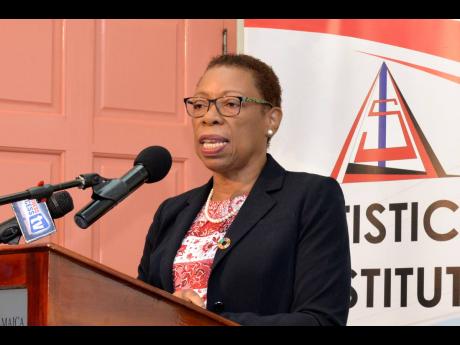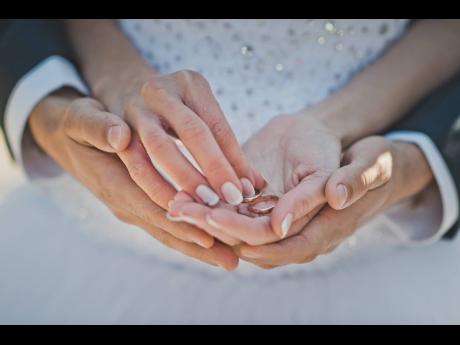Marriage gets cold shoulder
Jamaicans are fast falling out of love with marriage, as weddings have plunged almost 23 per cent in the nine years up to 2018. That means that almost 10,000 fewer people are getting married here.
The massive drop in unions has been attributed by marriage counsellors to younger couples shying away from the holy covenant. They also link the rise in divorces to spouses getting hitched for the wrong reasons.
Data from the Statistical Institute of Jamaica (STATIN) reveal that the number of new marriages fell to their lowest ebb in 2018, reflecting a steady decrease from 21,692 ceremonies in 2009 to 16,792 last year.
And all indications are that the number will rise as divorces climb, according to the STATIN data.
“Other demographic information of interest was for marriages and divorces. During 2018, there was a decline in marriages and an increase in divorces,” said Carol Coy, STATIN’s director general, releasing findings from several national surveys carried out in the past year.
“There were 16,719 marriages registered in 2018, a decline of 4.8 per cent compared to the 17,561 recorded in 2017. The divorce rate for 2018 was 20.4 divorces per 100 marriages, compared to the rate of 16.4 divorces per 100 marriages for 2017,” continued Coy.
According to STATIN, in 2017, there were 17,411 marriages in comparison to 3,166 divorces, while in 2016, there were 17,609 marriages, compared to 2,146 divorces. In 2015, there were 18,373 marriages to 1,734 divorces, according to the government agency.
MARRIAGE FAILURE FACTORS
Some couples listed lack of communication, persons failing to live up to financial responsibility, extramarital affairs, partners not being honest about their whereabouts, partners growing apart, and age differences as some of the major factors for marriage failures.
Other reasons include incompatible sexual preferences, as well as migration and a breakdown because of long distance. Other persons just walked out of their relationship without disclosing the reason.
In the meantime, counsellors have referred to the incidence of gender-based violence as one factor that has driven many young Jamaicans to shun lifelong commitment to one partner.
Two weeks ago, 42-year-old Rouleene Clarke Gowans was shot dead by her estranged husband Patrick Gowans in front of their 12-year-old daughter on Waltham Park Road in St Andrew.
That followed the deaths of Suzanne and Gary Puranda, a common-law couple and residents of Chestervale Avenue in Kingston in March. The couple were reportedly arguing when Mr Puranda shot his spouse before turning the gun on himself.
“A lot of young people are finding marriage unattractive because they observe their own parents’ marriages and they do not like what they see. They don’t see them being happy, they hear them complain and they see the quarrels. They see marriages as a way of being trapped, and getting out of it can be expensive,” said Dr Barry Davidson, marriage and family therapist and chief executive officer of Family Life Ministries.
“And we have the divorces because people are getting married for the wrong purposes. Some people marry for romance, but then the romance dies, while another set of people see marriage as a contract; you have something that I need,” he said.
Carla Dunbar, CEO of Carla Dunbar Ministries and Counselling Care, agrees, explaining that younger Jamaicans tend to dwell on the negative aspects of marriage as opposed to the positives.
“They see the squabbles and the fights, and some of them come from broken homes, too, and because of these things that they are seeing, you find the scenario in Jamaica as it is,” said Dunbar, who recently launched a Grow Your Marriage Ministry, the first online marriage club aimed at working with married couples to improve their unions.
“Divorce should really be a last resort,” she added.
However, for Dr Orville Taylor, head of the Department of Sociology at The University of the West Indies, of more importance to him are not the marriage data, per se, but whether there has been a decrease in the number of stable unions.
“At no point at all in our modern existence as a post-slavery society has the majority of unions or family forms been based on official marriage. Eighty per cent of our children have been born outside of wedlock,” Taylor told The Sunday Gleaner.
The university lecturer posited that the decline in weddings might be linked to the empowerment of women, through greater access to higher education and increased focus on their careers, thus delaying lifelong commitment.
“I think a number of things would be related to a reduction in the marriage level. It is also connected to, ironically, the empowerment of women.
“We have seen increased participation of females in the labour force on one hand, we have also seen an increase in the amount of time women are taking before they have their first child, and there is the preponderant evidence of women spending more time in tertiary education and outpacing men,” he noted, explaining that Jamaican women are taking more control of their lives.


